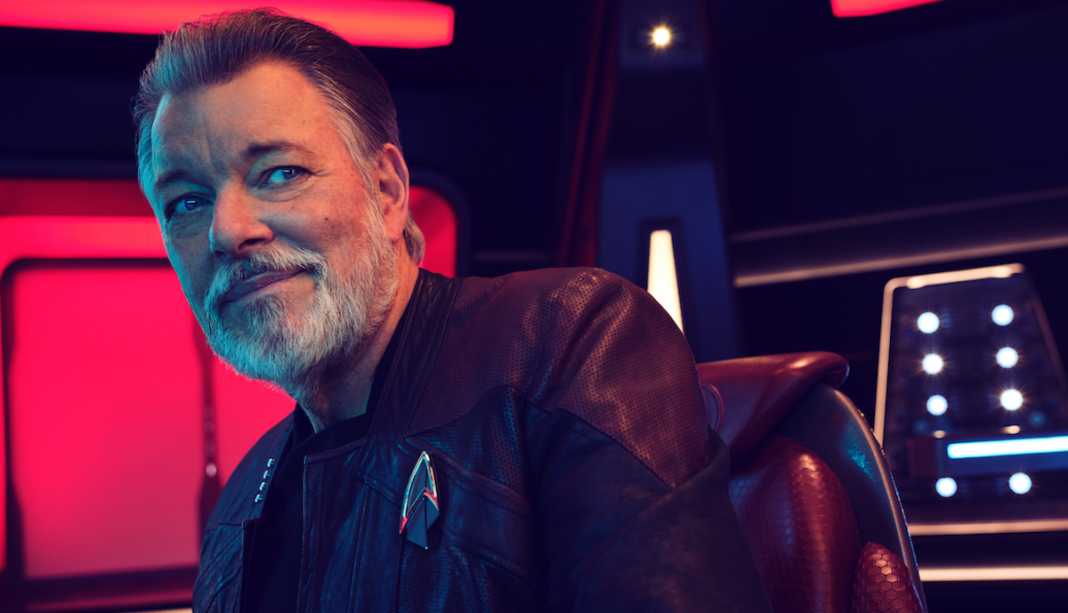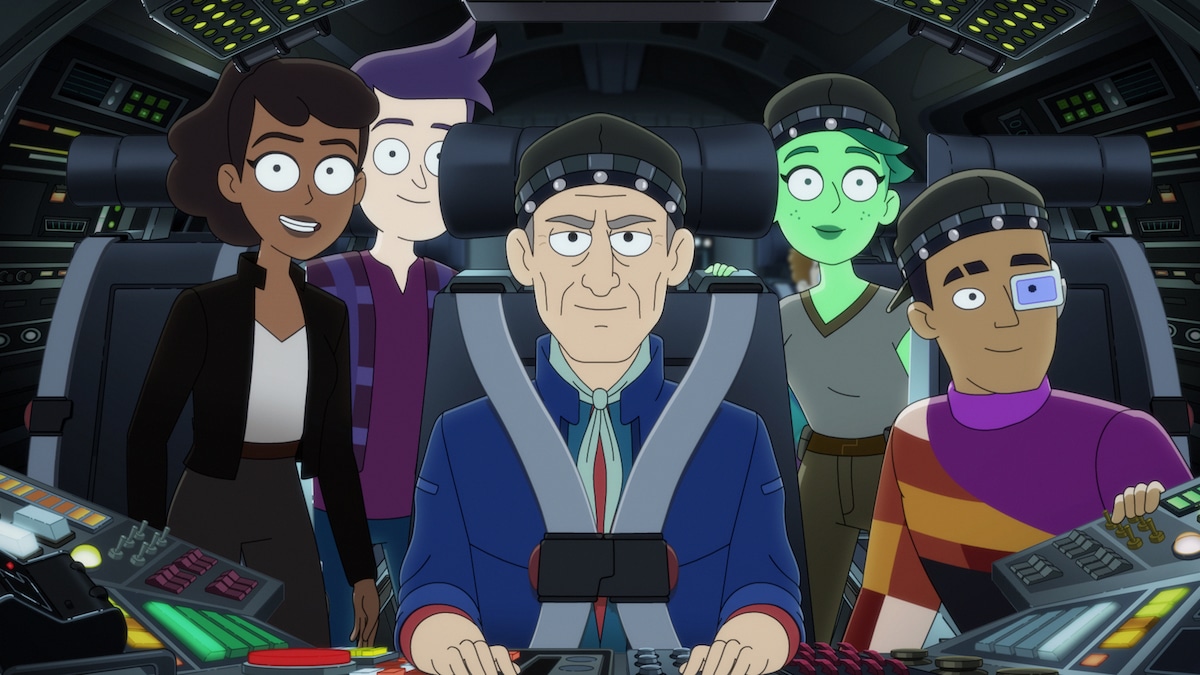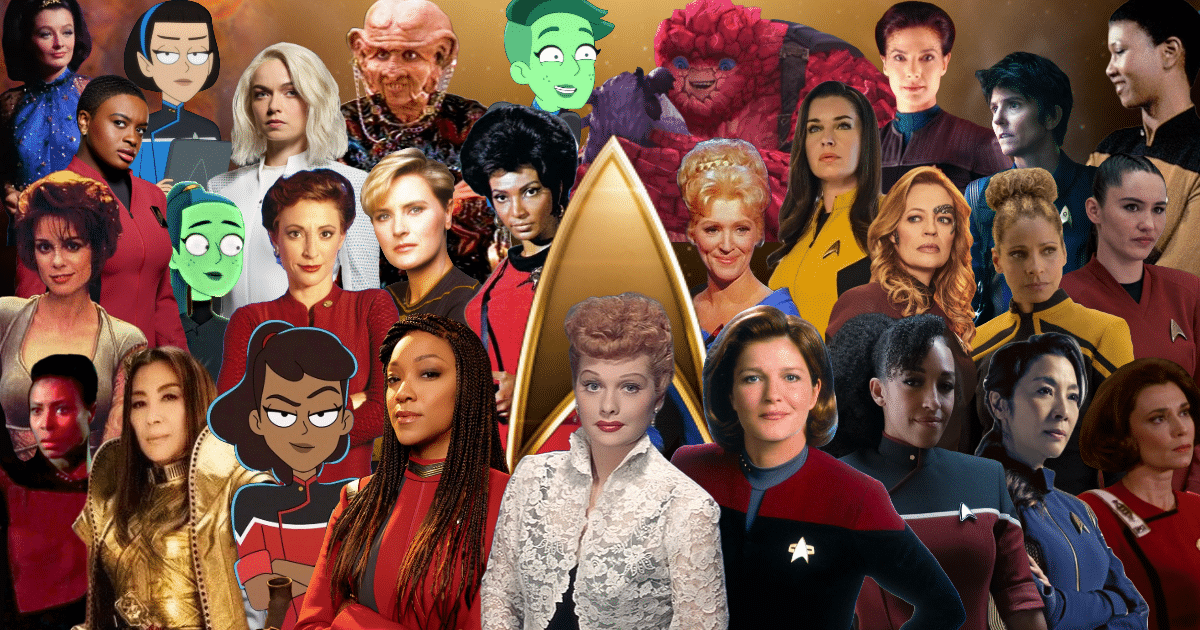RED ALERT! This interview contains spoilers for the fourth and most recent episode of Star Trek: Picard season 3, “No Win Scenario,” currently available for streaming on Paramount+.
Jonathan Frakes originated the character of William T. Riker in the first episode of Star Trek: The Next Generation. One beard, several Star Trek shows, a lot of experience directing, and thirty-six years later, Frakes returns to the role of Riker (and the director’s chair) for Picard season 3!
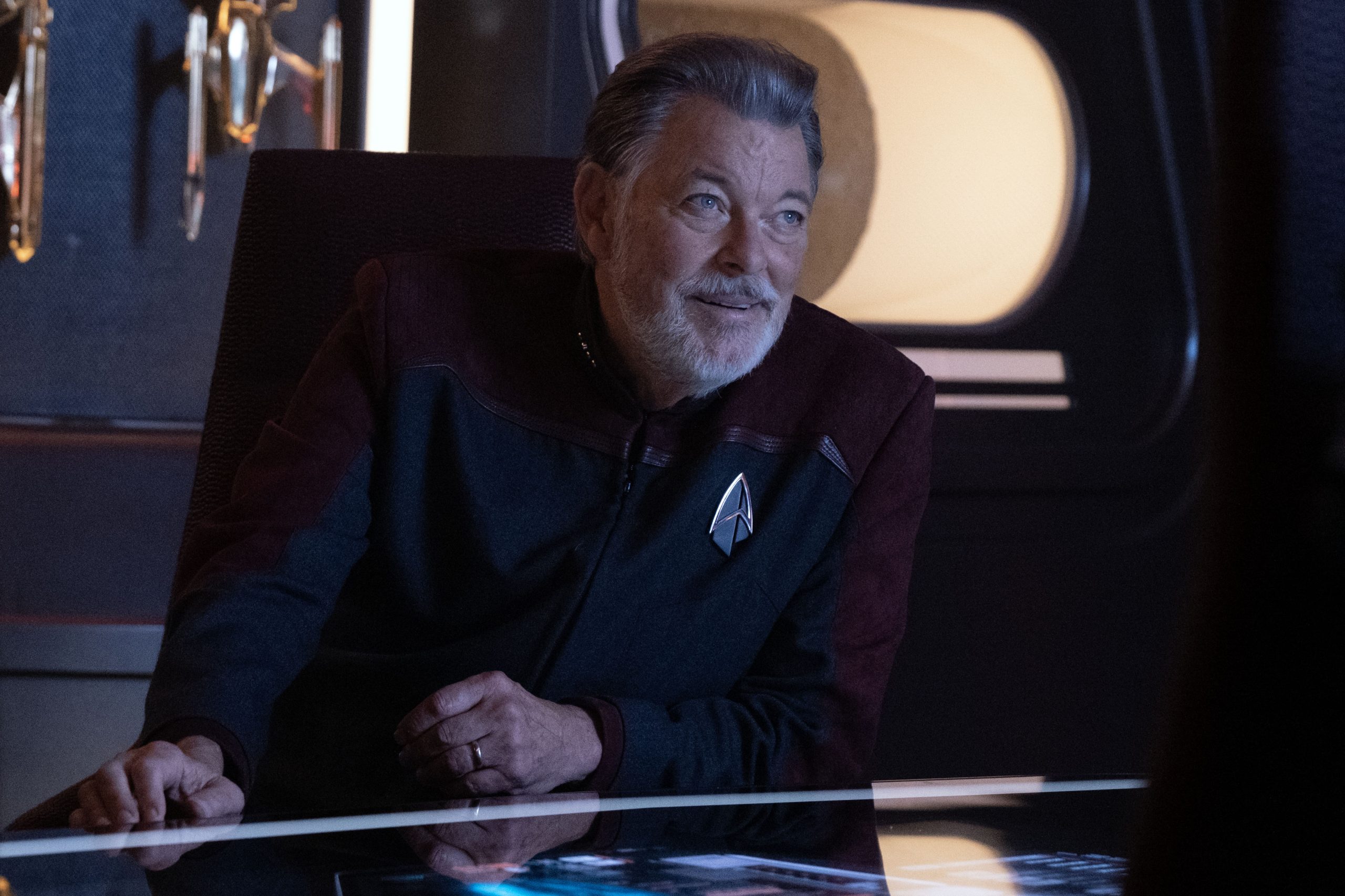
The Beat leaped at the opportunity to interview Frakes about directing and appearing in the Picard season 3 episodes “Seventeen Seconds” and “No Win Scenario.” We learned about the Enterprise-D crew stories he shared with two Discovery crewmembers, and found out whether or not he’s aiming to work on the one currently ongoing Trek show that isn’t already listed on his IMDB page.
This interview has been edited for clarity and length.
AVERY KAPLAN: “No Win Scenario” is a story that foregrounds the theme of maintaining hope in a seemingly hopeless situation. From a directorial perspective, how did you draw this theme out in the episode?
JONATHAN FRAKES: Well it all starts with the brilliant [Picard season 3 showrunner] Terry Matalas. The story at the end of episode 3, “Disengage,” is that we’re all going to die. So, we’ve got a place to recover. We’ve hit an emotional bottom, so now we have to climb back into the emotional satisfaction that we get at the end of episode 4, where there is a birth of all these beautiful eggs.
Each scene has to have its own point of view and intention and clarity with the overall arc of returning from hopelessness to hope. And again, if it’s not on the page, it is very hard to find. And because this season has been so well plotted and so well thought out and so well detailed, it was a blueprint that was very clear to me.
I had Crescenzo G.P. Notarile, who was my cinematographer, to help. So during prep, we decided how we would tell the story. We would gradually move the camera in, we’d slow the camera down… Because a lot of the stuff that we shot in those two episodes was handheld and somewhat frantic. As things resolved, we obviously changed the visual language by slowing the movement down, making the camera less frantic.
So all of that tied in with staying on-point in the story. The intention of the scene, the beats of each scene needed to be clear; what each character wants to achieve from the other characters in the scene; who’s the focus in the scene.
So, whose story are you really telling? Is it Picard’s decision, because he’s been thrown off the bridge; is he suffering? Riker regrets making the decision of listening to Picard. The other characters on the bridge are scared; are they going to die? Beverly Crusher (Gates McFadden) finally has broken the news to Picard that Jack (Ed Speleers) is his son – and also, we have a separate highway that has Raffi (Michelle Hurd) and Worf (Michael Dorn) telling an entirely different story that we have not connected to yet!
So there’s a lot going on. So luckily, in the case of Dorn and Hurd, I don’t think either of them has ever been better. I’ve worked with both of them a lot, on other shows, and they’re a wonderful team. I’m sure you agree.
KAPLAN: Absolutely. I understand that the episodes this season were filmed in “blocks.” However, I’m curious how you ended up with episodes three and four. Did you get to choose or were they assigned…?
FRAKES: Oh, they’re assigned early on. Actually, a director named Chris Byrne, who is in the Star Trek directing world in Canada, was meant to direct episodes 3 and 4 because he’s very creative. And something with the COVID protocols prevented him.
It was a very unfortunate situation for him, and a very fortuitous situation for me, that I got those episodes. Because originally I was not going to do episodes in season 3 because I was so busy playing Riker.
It worked out pretty well for me, I’ve got to say. In all humility, I was thrilled to get them.
KAPLAN: I was going to ask if your directing episodes 3 and 4 was an intentional homage to Nimoy’s direction of Star Trek III and IV, but obviously that was just a happy coincidence.
FRAKES: Just a happy coincidence, exactly.
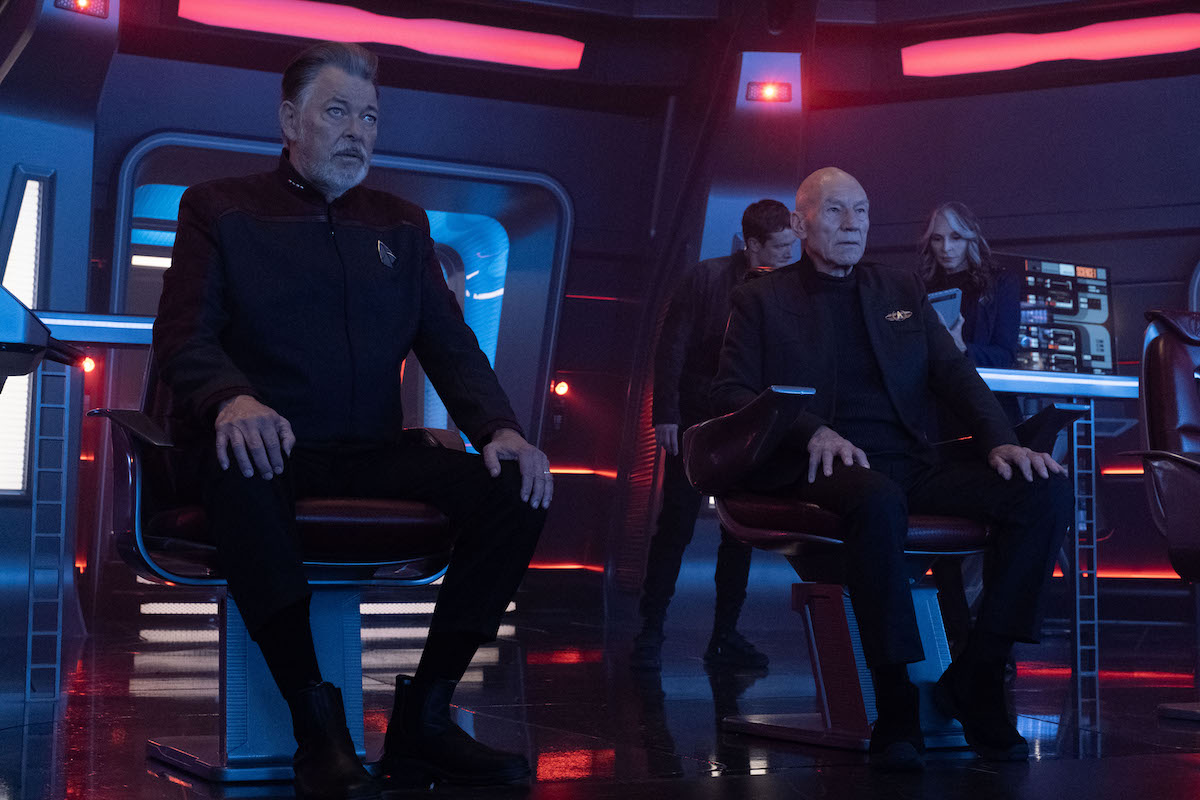
KAPLAN: “No Win Scenario” gives us our best look yet into the bridge crew of the Titan-A. What was it like working with the next next generation?
FRAKES: It reminded me a little bit of when I was on Star Trek: Discovery, where I met all these wonderful new actors who were on the bridge of that ship. And they were fascinated about what it’s like to be in the Star Trek family. We started talking about the conventions, we were talking about working on the bridge and what the characters actually did.
I was able to share some stories about LeVar Burton (Geordi La Forge) and Brent Spiner (Data) with Oyin Oladejo (Joanne Owosekun) and Emily Coutts (Keyla Detmer). How Data and Geordi addressed their consoles and assigned certain parts of the console to do certain maneuvers. They had already sort of gone down that path, but they embraced it and realized you can do a lot with a little instead of just “tap-tap-tap-tap-tapping” with your fingers. The more specific you are, the more interesting it is.
The Titan-A crew was surrounded by the beautiful visuals that Dave Blass and Michael Okuda and others had created. The bridge of the Titan is gorgeous and shoots beautifully; there are no bad angles on that bridge.
Because it was a new job, and a new experience – it’s a new experience, to be on Star Trek for an actor. It’s different from any other show unless you’ve done Battlestar Galactica or something. You have a uniform that’s an odd thing to be wearing, you’re in a world where you don’t know what these screens represent or do or see. So you have to find a way to make your office, or your home, or your station, your own. I was able to talk to them individually about owning that.
Your style is determined by how you stand, how you sit, the way you use the equipment. And I was able to share a lot of the things that I’ve learned on the other bridges with those actors.
KAPLAN: One of the final scenes in “No Win Scenario” features Riker in remote conversation with Deanna. I’m curious about how you practically tackled these scenes. Was Deanna filmed in advance?
FRAKES: Deanna (Marina Sirtis) was not filmed in advanced. I shot the remote scene with the script supervisor reading Marina’s lines, and then I had Marina record the lines on a voice memo and send them to me for the edit.
Then she came in to shoot her scenes. So they were pieced together.
KAPLAN: Many have cited the invigorating energy you bring to a set as director. To what do you credit this contagious zest?
FRAKES: (chuckling) “To what do I credit this contagious zest?”
I believe that since we’re going to be there for 12 to 14 hours, we should be able to collaborate, we should be able to have a few laughs, and we can get the work done, without too much Sturm und Drang.
KAPLAN: You’ve directed several episodes that were pivotal for trans characters on Star Trek: Discovery. Do you have any thoughts you’d like to share with trans Star Trek fans as the series concludes?
FRAKES: I think Discovery has carried the mantle of the LGBT community, and specifically the trans community, as effectively as any of the Star Treks.
Wilson Cruz (Hugh Culber) and Anthony Rapp (Paul Stamets) as gay icons have been incredibly helpful to the trans characters on the show, and I think to the trans community in general. And Michelle Paradise, whose’s our producing director, has written beautifully to it, and for it, and for them.
I’m very proud to be part of Discovery. And that’s specifically I think one of the things that has made that show unique.
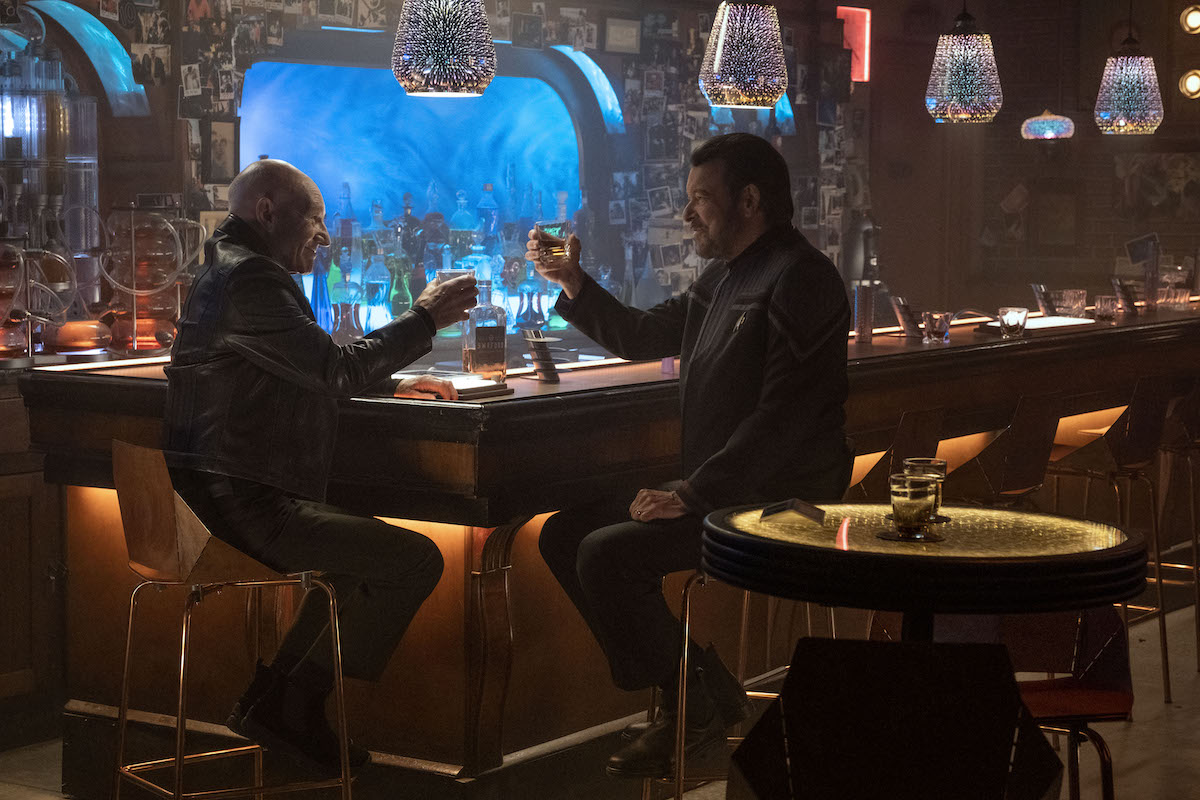
KAPLAN: You’ve appeared in and/or directed on every Star Trek series since TNG with one exception. Are you interested in being involved in Star Trek: Prodigy, and if so, in what capacity?
FRAKES: How do you think I could fit into Prodigy? I would love to be part of that.
KAPLAN: It’s set only a few years after Star Trek: Lower Decks, when – as far as we know – the second Titan is out there.
FRAKES: Maybe my boy Bradward Boimer (Jack Quaid) and I can go over there and make an appearance on Prodigy.
KAPLAN: Or, there’s so many Orion on the Titan-A, maybe D’Vana Tendi (Noël Wells) is involved.
FRAKES: Yeah. Good idea!
New episodes of Star Trek: Picard are available for streaming on Paramount+ on Thursdays.
Read all of The Beat’s Star Trek coverage by clicking here!


